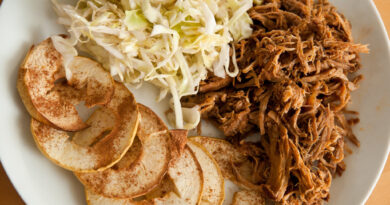Okpa
Exploring Okpa: Nigeria’s Delicious and Nutritious Bean Cake
Introduction: Nigeria’s culinary landscape is rich with diverse flavors and traditional dishes that reflect the country’s cultural heritage and regional diversity. Among these culinary treasures is Okpa, a savory and satisfying bean cake that has been enjoyed for generations in the eastern part of Nigeria. In this comprehensive guide, we delve into the origins, ingredients, preparation methods, nutritional benefits, cultural significance, and modern adaptations of Okpa, inviting you to discover the irresistible allure of this beloved West African delicacy.
Origins and Cultural Significance: Okpa, also known as Bambara nut pudding, traces its origins to the Igbo ethnic group in southeastern Nigeria, where it has been a staple food for centuries. The dish is traditionally prepared using Bambara groundnut flour, which is derived from the Bambara groundnut (Vigna subterranea), a leguminous crop native to West Africa.
Beyond its culinary appeal, Okpa holds cultural significance in Igbo society, often served during special occasions, celebrations, and communal gatherings. It is cherished for its ability to bring people together, fostering a sense of unity, hospitality, and shared identity among family members, friends, and neighbors.
Ingredients and Preparation: The ingredients for Okpa are simple yet flavorful, reflecting the resourcefulness and ingenuity of Nigerian cuisine. The key components include:
- Bambara Groundnut Flour: The main ingredient, ground from dried Bambara groundnuts, provides protein, fiber, and essential nutrients.
- Palm Oil: Adds richness and depth of flavor to the Okpa batter, contributing to its distinctive taste and vibrant color.
- Seasonings: Onions, chili peppers, crayfish, and other spices are used to enhance the flavor profile of the Okpa.
- Baking Powder: Helps leaven the batter, resulting in a light and fluffy texture.
- Water: Used to mix the ingredients into a smooth batter, ensuring the Okpa is moist and tender.
The preparation of Okpa involves several steps, including soaking, grinding, mixing, and steaming the batter to perfection. While the traditional method requires fermenting the batter overnight to enhance its flavor and texture, modern recipes often offer shortcuts for quicker preparation.
Nutritional Benefits: Okpa is not only delicious but also nutritious, offering a range of health benefits that make it a wholesome addition to any diet. Some of its advantages include:
- High Protein Content: Bambara groundnuts are a rich source of protein, essential for muscle repair, growth, and overall health.
- Fiber-Rich: Okpa contains dietary fiber, which promotes digestion, regulates bowel movements and supports gut health.
- Nutrient-Dense: The combination of Bambara groundnuts, palm oil, and seasonings provides vitamins, minerals, and antioxidants, beneficial for immune function and vitality.
- Low Glycemic Index: Okpa has a relatively low glycemic index, meaning it helps regulate blood sugar levels and may reduce the risk of diabetes when consumed as part of a balanced diet.
- Satiety: The protein and fiber in Okpa promote feelings of fullness and satiety, making it a satisfying and nourishing meal option.
Cultural Significance: In Igbo culture, Okpa holds a special place in daily life, serving as a symbol of tradition, heritage, and culinary craftsmanship. It is often enjoyed as a breakfast staple, street food snack, or side dish, accompanied by spicy sauces, vegetables, or protein-rich accompaniments.
Moreover, Okpa plays a significant role in cultural ceremonies and social gatherings, where it is shared among family members, friends, and guests as a gesture of hospitality and goodwill. Whether enjoyed at home, in local markets, or at festive celebrations, Okpa brings people together, fostering a sense of community and camaraderie.
Modern Adaptations: While Okpa remains deeply rooted in tradition, it has also evolved to adapt to modern tastes and lifestyles. Today, innovative chefs and home cooks are reinventing this classic dish, incorporating new flavors, ingredients, and cooking techniques to create contemporary interpretations of Okpa.
From vegan and gluten-free variations to gourmet twists featuring exotic spices and toppings, the possibilities for Okpa are endless. Its versatility and adaptability make it a favorite among food enthusiasts seeking both nostalgia and innovation in their culinary adventures.
Conclusion: In the vibrant tapestry of Nigerian cuisine, Okpa stands as a testament to the ingenuity, resilience, and culinary creativity of the Igbo people. From its humble origins to its modern adaptations, Okpa continues to captivate hearts and palates, offering a taste of tradition and a glimpse into the rich heritage of West Africa. So, why not savor the irresistible flavors of Okpa and embark on a flavorful journey through Nigeria’s culinary landscape? With each bite, you’ll discover the warmth, depth, and enduring legacy of this beloved West African delicacy.



